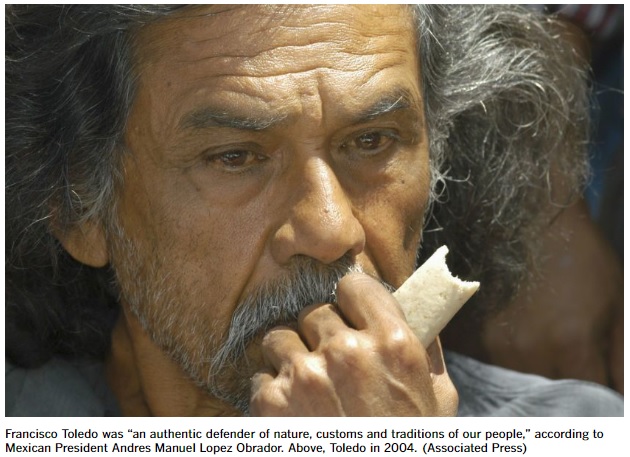Francisco Toledo, the celebrated Mexican artist and cultural philanthropist who drew on his indigenous pre-Colombian heritage to create striking works suffused with shamanistic animal imagery, died on Thursday. He was 79.
President Andrés Manuel López Obrador of Mexico announced the death on Twitter, calling Mr. Toledo “a true defender of nature, customs and traditions of our people.” No other details were given.
Toledo was regarded by many as Mexico’s greatest living artist, one who could trace his lineage to the Zapotecs, who flourished before the 16th-century Spanish conquests in what is now the southern state of Oaxaca, his native region. His paintings, drawings, prints, collages, tapestries and ceramics were largely inspired by that heritage.
The scorpions and grasshoppers and alligators, monkeys and tapirs that he encountered in his childhood appear in his art as symbols and metaphors, alluding to everything from sex and fertility to a dying natural landscape.

Toledo’s enigmatic paintings and sculptures were marked by the animals, colors and traditions of Oaxaca. Insects, cats, and other animals were presented in almost mythological contexts in Toledo’s work, whose colors also evoked the brilliant palette of Oaxaca.
His activism was also centered in Oaxaca, particularly for saving its historic buildings and green spaces and defending against cultural encroachment.
Wild-haired and bearded, Toledo led movements to save old convents and other colonial-era buildings from developers and helped turn them into centers for the arts and gardens. He also led a fight in the early 2000s against the opening of a fast-food chain in downtown Oaxaca city, the state capital.
Culture Secretary Alejandra Frausto wrote of the artist “something flowered at every step Toledo took.”
R.I.P. Maestro Toledo
San Miguel Times Newsroom

